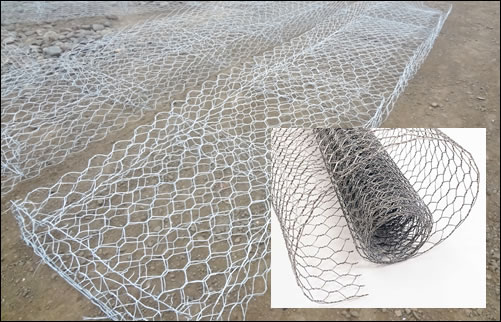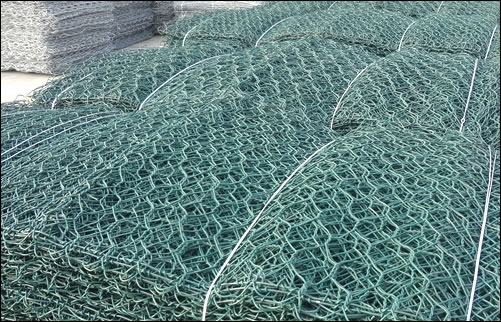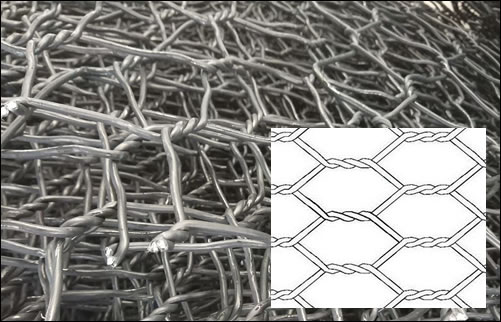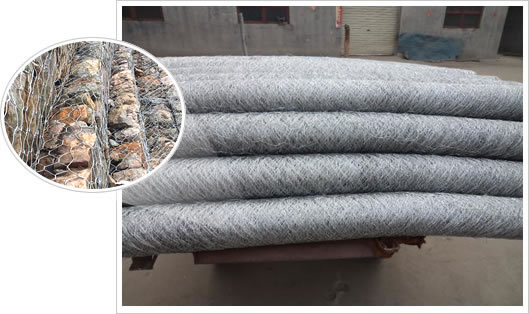

We offer gabions mesh manufacturing from these wire materials:
Hot-dipped galvanized;
Electro galvanized;
Hot-dipped galvanized then PVC / vinyl / polymer coated;
Galfan ( zinc aluminum galvanizing);
Galfan then pvc coated.
Gabions wire mesh zinc coated:

Description: Gabion mesh rolls, 2.7mm wire diameter, 25m roll length; 8 x 10cm mesh size.
PVC Coated Galvanised Gabion Mesh:

Description: Zn pvc mesh rolls for basket making, 6x8 mesh x 2.7mm
Weaving Types:
Double twist;
Triple twist.
Double Twisted Hexagonal Wire Netting for Gabions

Description: Hexagonal Wire Netting, opening size: 60mm x 80mm; Wire Diameter 2.2mm; double twist weave.
Triple Twisted Hexagonal Wire Netting for Gabions

Hot dip galvanized wire mesh twist woven is popular materials for gabions making.
Zinc coating standard for hexagonal mesh: In accordance to EN and other international standard.
Gabion Mesh Galvanized for Retaining Wall and Rock Fall Protection System
Wires for producing meet following standard:
Tensile strength: Between 3 8 0 - 5 5 0 N/mm2 exceeding standard of EN10223-3.
Wire Elongation: Min. 10%, meet
EN10223-3.
Zinc coating: Quantities of zinc shall
meet the requirements of EN10244-2.
Adhesion of Zinc coating to the wire: Meet EN 10223-3.
Standard Wire Mesh
| Mesh | Ø Wire (mm) | ||
| Type | D (mm) | Mesh | Selvedge |
| 5x7 | 50 | 2.0 | 2.4 |
| 6x8 | 60 | 2.2 2.7 |
2.7 3.4 |
| 8x10 | 80 | 2.7 3.0 |
3.4 3.9 |
| 10x12 | 100 | 2.7 3.0 |
3.4 3.9 |
Finished Products:
Gabions basket and mattress containers;
Rockfall mesh draperies.
Gabions Fabricated of Hex Mesh Sheet:
Front panel, back panel, side and lids
Fabrication
Gabions shall be manufactured with all components mechanically connected at the production facility. The front, base, back and lid of the gabions shall be woven into a single unit. The ends and diaphragm(s) shall be factory connected to the base. The lid may be a separate piece made of the same type mesh as the basket. All perimeter edges of the mesh forming the basket and top, or lid, shall be selvedge with wire having a larger diameter.
Gabion is divided into cells by means of diaphragms positioned at approximately 1 m centres. The diaphragms shall be secured in position to the base so that no additional lacing is necessary at the jobsite.
Typical Gabion sizes
| Length, m | Width, m | Height, m | Number of Diaphragms |
| 4.0 | 1.0 | 1.0 | 3 |
| 3.0 | 1.0 | 1.0 | 2 |
| 2.0 | 1.0 | 1.0 | 1 |
| 1.5 | 1.0 | 1.0 | 0 |
| 4.0 | 1.0 | 0.5 | 3 |
| 3.0 | 1.0 | 0.5 | 2 |
| 2.0 | 1.0 | 0.5 | 1 |
Construction Requirements
Gabion filling and lacing and erection at site should be strictly as per the instruction of approved (by engineer) manufacturer's instmctions as per the site specific requirements.
Assembly
Gabions are supplied folded flat and packed in bundles. Larger units may be supplied in rolls. The units are assembled individually by erecting the sides, ends, and diaphragms, ensuring that all panels are in the correct position, and the tops of all sides are satisfactorily aligned. The four comers shall be connected first, followed by the internal diaphragms to the outside walls.
The procedure for using lacing wire consists of cutting a sufficient length of wire, and first looping and/or twisting the lacing wire to the wire mesh. Proceed to lace with alternating double and single loops through every mesh opening, pulling each loop tight and finally securing the end of the lacing wire to the wire mesh by looping and/or twisting.
Installation
After initial assembly, the gabions are carried to their final position and are securely joined together along the vertical and top edges of their contact surfaces using the same connecting procedure(s) described earlier. Whenever a structure requires more than one layer, the upper empty baskets shall also be connected to the top of the lower layer along the front and back edges of the contact surface.
Internal Connecting Wires installation
Internal Connecting Wires shall connect the exposed face of a cell to the opposite side of the cell. An exposed face is any side of a gabion cell that will remain exposed or unsupported after the structure is completed. Lacing wire or prefabricated internal connecting wires shall be used as internal connecting wires.
Fabricating of 1 meter High Gabions
1-meter-high gabions shall be filled in three layers, 300 mm at a time. Connecting wires shall be installed after the placement of each layer, that is, at 300 mm high.
Fabricating of Half meter High Gabions
0.5-meter-high gabions do not require connecting wires unless the baskets are used to build vertical structures. These units shall be filled in two layers 250mm at a time. Connecting wires shall be installed after the placement of the first layer, which is at 250mm high.
Lid Closing
Once the gabion baskets are completely full, the lids will be pulled tight until the lid meets the perimeter edges of the basket. The lid must then be tightly laced and/or fastened along all edges, ends and tops of diaphragm(s) in the same manner as described in earlier sections.
Mesh cutting and folding
Where shown on the drawings or otherwise directed by the engineer, the gabions shall be cut, folded and fastened together to suit existing site conditions. The mesh must be cleanly cut and surplus mesh either folded back or overlapped so that it can be securely fastened together with lacing wire or fasteners in the manner described in earlier Section. Any reshaped gabions shall be assembled, installed, filled and closed.
Testing and Acceptance criteria
The material should get approval from the client before the actual supply start. The manufacturer of the Gabion facing unit should provide "Manufacturers Test Certificate" and Quality Conformity Certificate for the material with every Iot/shipment. Tensile strength test and zinc coating test on basic wire shall be done on one sample per every 10,000 numbers of units supplied. PVC Coating Thickness: The thickness of the PVC coating shall be determined on a randomly chosen individual piece of wire removed from the coil at 3 places 1 metre apart.
Measure with a micrometre the diameter of the galvanized steel wire with PVC coating. Determine the thickness of the PVC coating by stripping the PVC coating from the wire and measure the reduced diameter with a micrometre, The thickness of the coating is the difference between the diameter of the galvanized steel wire with PVC coating and the measured diameter of the galvanized steel wire divided by two. The thickness values should be as per clause 1.2.4. While removing the PVC coating by stripping,take care not to remove any of the metallic surfaces.
Selvedge strength test
A tensile test on mesh sample (10x12 Mesh Type) shall be carried out in order to estimate selvedge strength test. The test shall be carried out as per procedure outlined below. The selvedge strength shall be minimum 25 kN/m.
a) Take a mesh of approximately 1.0 m width.
b) The height of the sample shall be such that after selvedging on both the sides (1m), there shall be at least two mesh repetitions between the two selvedged wires, so that effective height of the sample shall be more than 300 mm.
c) Sample shall be loaded on the UTM in a direction parallel to twist, with the samples being gripped at the two selvedged wires & not mesh twist.
d) The distance between the two selvedge wires shall be recorded as Initial gauge length.
Distance between the two end gripping points (pins) along the width of the sample shall be recorded as the unit width under test. The width shall be at least 700 mm. The load shall be applied gradually to the sample and the test be continued till the break point. The peak load and the % elongation shall be recorded. The strength of the selvedge connection shall be (peak load/unit width under test) expressed in kN/m.
Providing and placing stones in Gabion and Gabion mattress
a.) Laying of Wire crates
Wherever possible, crates shall be placed in position before filling with boulders. Undulations in the bed shall be levelled prior to placement of wire crate units. The crates shall be filled by carefully hand-picking the boulders as tightly as possible and not by merely throwing in.